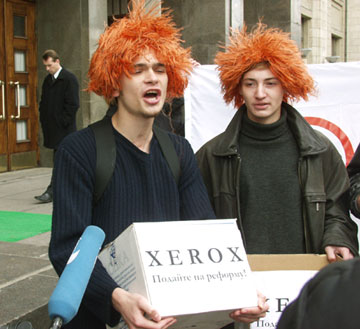| MOSCOW, Oct. 14 - Russia got a new start last
week on one of its boldest
economic reforms in years: breaking up its vast electricity monopoly.
But many questions remain about how the plan will be carried
out, and
investors and some lawmakers have warned that the process risks
repeating
the flaws and mistakes of privatization in Russia in the mid-1990's.
That
program was often manipulated by powerful insiders who stripped
away
valuable state assets and left outside shareholders with little
or nothing.
The Russian legal system is still trying to cope with the fallout.
A central concern that critics have about the breakup of the
monopoly, the
Unified Energy System, is that it is being driven by the company's
chief
executive, Anatoly B. Chubais. Mr. Chubais was the principal architect
of
the earlier privatization program.
The breakup plan for Unified Energy cleared an early legal hurdle
on
Thursday when a package of bills that will set the plan into motion
was
passed in the first of three required votes in the lower house
of
Parliament.
Mr. Chubais argues that the country's deteriorating power stations
from the
Soviet era need major new investment to keep Russia's electricity
grid, the
largest in the world, up and running.
To attract the necessary capital, he proposed in 2000 that parts
of the
company be broken off and sold. The government now owns 52 percent
of
Unified Energy, and its remaining shares are widely held by institutional
investors here as well as by some foreign investors.
But reports have since circulated that Mr. Chubais was striking
back-room
deals with powerful Russian financial groups to sell choice assets
to oil
and aluminum companies. The reports rattled investors, many of
whom
abandoned the stock. Unified Energy's shares have fallen by nearly
half
since the beginning of the year, while Russia's main stock index
has risen
by one-third.
"Foreign ownership has gone significantly down," said
Florian Fenner,
managing partner at UFG Asset Management in Moscow. "Two
or three years
ago, U.E.S. was very important in the Russian market. Now it's
easy to
ignore."
Mr. Chubais has denied that any of the rumored asset sales occurred.
Last month, he took pains to reassure the market, and he even
went before
an investment conference in Moscow to announce a moratorium on
asset sales.
The stock has since risen 2.4 percent.
The vote in Parliament last week is only the first step in a
complex
process. The reform bills still face a difficult second vote,
and then must
be passed by Russia's upper house and be signed by President Vladimir
V.
Putin before they become law.
Still, government officials, who have undertaken major overhauls
of
Russia's land ownership system and its court system this year,
counted last
week's vote as a victory that would advance another important
change in
Russia's economy.
But the bills have drawn opposition from both ends of the political
spectrum, from the liberal Yabloko party and the Communists.
Grigory A. Yavlinsky, the leader of Yabloko, said the breakup
plan would
put the entire electricity industry into the hands of a few rich
business
groups.
"A lot can be controlled" if the electricity industry
belongs to a select
few, he said at a press conference on Wednesday. "They'll
say, `Elect Mr.
Pupkin, or we'll turn off your lights.' And it will be clear to
everyone
that, yes indeed, they will turn off the lights."
But even as Mr. Chubais celebrated his victory in Parliament
last week, he
was under pressure from minority shareholders who are trying to
organize a
vote to remove him as chief executive. While unlikely to succeed
- a
similar attempt failed last year - the effort highlights shareholders'
frustration with Mr. Chubais.
"It's not about the overall plan, but its implementation,"
said Alexander
Branis, director at Prosperity Capital Management, a Moscow-based
investment fund, with $240 million in Russian equities, that is
taking part
in the initiative to remove Mr. Chubais. "The management
has absolutely no
right to sell the company's assets."
See also:
Energy
Sector Reform
 YABLOKO
rejects the government's variant for energy sector reform YABLOKO
rejects the government's variant for energy sector reform
Press Release, October 10, 2002
The YABLOKO faction in the State Duma will vote against the adoption
in the first reading of the "package" of draft laws
on reform of the electricity sector.
|